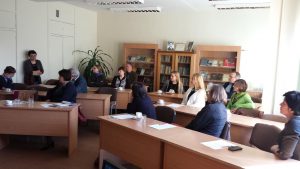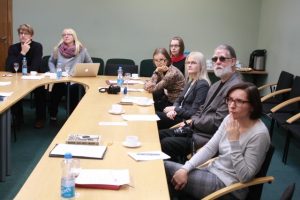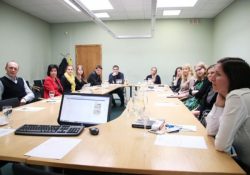 The Lithuanian Studies Research Department (former Lituanica Department) of the National Library of Lithuania hosted the third interdisciplinary seminar for young diaspora researchers on April 28, 2016. This year, the event took place at the Lithuanian University of Educational Sciences. Continue reading “A Third Seminar for Young Diaspora Researchers”
The Lithuanian Studies Research Department (former Lituanica Department) of the National Library of Lithuania hosted the third interdisciplinary seminar for young diaspora researchers on April 28, 2016. This year, the event took place at the Lithuanian University of Educational Sciences. Continue reading “A Third Seminar for Young Diaspora Researchers”
Tag: Laura Laurušaitė
Baltic Heritage Network XXII diaspora seminar: connecting research fragments
 On 3 November 2015 the Martynas Mažvydas National Library of Lithuania hosted the annual international Baltic Heritage Network diaspora seminar. It was the 22nd event in the last six years and the second to be held in Vilnius. It brought together researchers, librarians and archivists from all three Baltic countries working in the field of diaspora studies. In this international forum, eight papers were presented. Topics for three paper sessions ranged from collecting, exploring and digitizing archival data to making field research of diaspora communities, and analysing exile literature.
On 3 November 2015 the Martynas Mažvydas National Library of Lithuania hosted the annual international Baltic Heritage Network diaspora seminar. It was the 22nd event in the last six years and the second to be held in Vilnius. It brought together researchers, librarians and archivists from all three Baltic countries working in the field of diaspora studies. In this international forum, eight papers were presented. Topics for three paper sessions ranged from collecting, exploring and digitizing archival data to making field research of diaspora communities, and analysing exile literature.
Diaspora seminars, covering a wide range of interests and topics, are designed to help to exchange information and encourage sustained critical dialogue without dividing attendees into their disciplinary camps. New people and presenters join the BHN seminars every year. This time the event offered a good balance between three Baltic countries and a good distribution of participants from Lithuania, Latvia and Estonia. The small-scale setting of the conference allowed for an intimate exchange of ideas. Opportunity to place one’s own research in a wider cultural context and learn about the skills and techniques used by other scholars was a significant advantage of this seminar.
The whole article can be read at >>>
Diaspora Researchers Gathered At The National Library of Lithuania
 For the second year in a row, the Lituanica Department invited diaspora researchers to the seminar. During the one-day event, the participants heard three presentations about Lithuanian diaspora. Dr Ramūnas Čičelis, the lecturer at Vytautas Magnus University (VMU), talked about the philotopic aspect in Jonas Mekas, an American Lithuanian artist; Akvilė Šimėnienė, who studies in the doctorate program at the Institute of Lithuanian Literature and Folklore, shared her findings about Dr Birutė Ciplijauskaitė’s literary criticism; and the doctorate student at the Lithuanian Academy of Arts, Jolanta Bernotaitytė, discussed the representations of the Lithuanian American art in the 20th century during the sixties and nineties. Vilnius University historian Dr Tomas Balkelis, who spoke about the international aspect of diaspora and migration studies, urged the seminar’s participants to write theirarticles and books not only to a Lithuanian, but a foreign reader as well and their research to look for Lithuanian connections with other nations and communities.
For the second year in a row, the Lituanica Department invited diaspora researchers to the seminar. During the one-day event, the participants heard three presentations about Lithuanian diaspora. Dr Ramūnas Čičelis, the lecturer at Vytautas Magnus University (VMU), talked about the philotopic aspect in Jonas Mekas, an American Lithuanian artist; Akvilė Šimėnienė, who studies in the doctorate program at the Institute of Lithuanian Literature and Folklore, shared her findings about Dr Birutė Ciplijauskaitė’s literary criticism; and the doctorate student at the Lithuanian Academy of Arts, Jolanta Bernotaitytė, discussed the representations of the Lithuanian American art in the 20th century during the sixties and nineties. Vilnius University historian Dr Tomas Balkelis, who spoke about the international aspect of diaspora and migration studies, urged the seminar’s participants to write theirarticles and books not only to a Lithuanian, but a foreign reader as well and their research to look for Lithuanian connections with other nations and communities.
The Head of the Lithuanian Literature Department at VMU, Assoc. Dr Dalia Kuizinienė, noticed that a lot of important research in the field of the Lithuanian diaspora had been carried out over the past 25 years. However, she noted that there are still quite a few holes and gaps remaining. She agreed with Assoc. Dr Žydronė Kolevinskienė, dean of Lithuanian Philology Faculty at the University of Educational Sciences that not a lot has been done to research the most recent Lithuanian emigrant literature, Lithuanian foreign press, as well as theatre and visual arts.
At the end of the seminar, a book presentation, The nostalgia and mimicry: Lithuanian and Latvian post-war diaspora novels by Laura Laurušaitė (Vilnius: Institute of Lithuanian Literature and Folklore), took place. Guests, Dr Manfredas Žvirgždas, Assoc. Dr Kuizinienė and Dr Čičelis, stressed the novelty of the book, especially the methodological tools, comparative and postcolonial perspectives, and their successful adaptation for Lithuanian and Latvian emigrant novels. The author of the monograph noted that one of her main objectives while writing the book was to introduce Lithuanian readers to a rich Latvian diaspora prose, especially bearing in mind that not a single work from more than 400 Latvian diaspora novels published in post-war is available in Lithuanian language.
Dalia Cidzikaitė